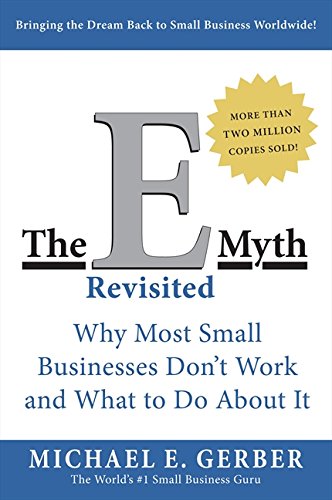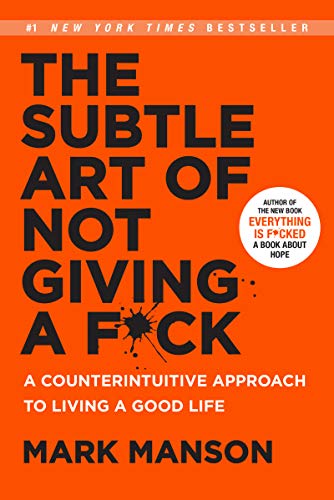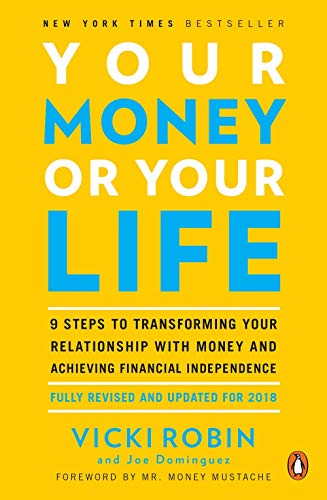Top products from r/leanfire
We found 22 product mentions on r/leanfire. We ranked the 55 resulting products by number of redditors who mentioned them. Here are the top 20.
1. The Little Book of Common Sense Investing: The Only Way to Guarantee Your Fair Share of Stock Market Returns
Sentiment score: 0
Number of reviews: 1
The Little Book of Common Sense Investing The Only Way to Guarantee Your Fair Share of Stock Market Returns
 Show Reddit reviews
Show Reddit reviews2. YouMap: Find Yourself. Blaze Your Path. Show the World!
Sentiment score: 1
Number of reviews: 1
 Show Reddit reviews
Show Reddit reviews3. The E-Myth Revisited: Why Most Small Businesses Don't Work and What to Do About It
Sentiment score: 0
Number of reviews: 1
HarperCollins
 Show Reddit reviews
Show Reddit reviews4. Creating Cohousing: Building Sustainable Communities
Sentiment score: 1
Number of reviews: 1
 Show Reddit reviews
Show Reddit reviews5. The Art of Disappearing: Buddha's Path to Lasting Joy
Sentiment score: 1
Number of reviews: 1
Wisdom Publications MA
 Show Reddit reviews
Show Reddit reviews7. How to Stubbornly Refuse to Make Yourself Miserable About Anything--Yes, Anything!
Sentiment score: 1
Number of reviews: 1
 Show Reddit reviews
Show Reddit reviews8. How to Cook Everything: 2,000 Simple Recipes for Great Food,10th Anniversary Edition
Sentiment score: 1
Number of reviews: 1
huge cook book with 2,000 simple recipes for great food10th anniversary edition of How to Cook Everything
 Show Reddit reviews
Show Reddit reviews9. How to Cook Everything Vegetarian: Simple Meatless Recipes for Great Food
Sentiment score: 1
Number of reviews: 1
VegetarianCookRecipe
 Show Reddit reviews
Show Reddit reviews10. I Will Teach You To Be Rich
Sentiment score: 1
Number of reviews: 1
I Will Teach You to Be Rich
 Show Reddit reviews
Show Reddit reviews11. How to Retire Overseas: Everything You Need to Know to Live Well (for Less) Abroad
Sentiment score: 1
Number of reviews: 1
no marks no dog ears excellent condition
 Show Reddit reviews
Show Reddit reviews12. The Subtle Art of Not Giving a F*ck: A Counterintuitive Approach to Living a Good Life
Sentiment score: 1
Number of reviews: 1
HARPER ONE
 Show Reddit reviews
Show Reddit reviews14. Nomadland: Surviving America in the Twenty-First Century
Sentiment score: 1
Number of reviews: 1
Nomadland: Surviving America in the Twenty-First Century Hardcover – September 19, 2017
 Show Reddit reviews
Show Reddit reviews15. The Wisdom of Insecurity: A Message for an Age of Anxiety
Sentiment score: 1
Number of reviews: 1
The Wisdom of Insecurity A Message for an Age of Anxiety
 Show Reddit reviews
Show Reddit reviews16. The 4-Hour Body: An Uncommon Guide to Rapid Fat-Loss, Incredible Sex, and Becoming Superhuman
Sentiment score: 0
Number of reviews: 1
 Show Reddit reviews
Show Reddit reviews18. Ikigai: The Japanese Secret to a Long and Happy Life
Sentiment score: 1
Number of reviews: 1
 Show Reddit reviews
Show Reddit reviews




I'm British, so most of the financial discussion I do is on /r/UKPersonalFinance - if you were British I would say to read Tim Hale's book and to read that subreddit every day.
Most of the people on /r/UKPersonalFinance and the financial subreddits I read don't advocate buying individual stocks, but buy index funds instead.
A stockmarket index, like the FTSE 100 or S&P 500, is a "basket" composed of the stock prices of many individual companies, weighted by their size. The FTSE 100 contains the UK's largest 100 companies, the S&P 500 contains the USA's 500 largest companies.
Originally, these indexes were constructed as benchmarks - investors could use them to assess whether Walmart is a good investment by comparing it to the index. If a company performs better than the index, then it's performing better than the average for companies of comparable size (and company size is relevant to risk).
However there is a large body of evidence that the majority of people who buy stocks in individual companies achieve lower-than-average returns (costs of trading are a factor in this).
Hence financial manager Jack Bogle invented a financial product called the "index fund", whereby an investment company buys stocks in all the companies in a stockmarket index, and you buy shares in the fund. Because they don't have to trade so often, and for other reasons, these funds have much lower costs and, on average, achieve better returns.
You must diversify to reduce your risk. If you buy shares only in Apple, then your returns will be less than average, compared to the sector, if Android is more successful; maybe the tech sector will perform more poorly than hotels, construction or retail. Likewise if you buy a house to rent out, you expose yourself to the economic fortunes of the town and state it's located in; maybe the local factory will close, and lots of people will lose their jobs, suppressing rental yields in the area; maybe your tenants will trash the place, or your neighbour's sewage will leak on to your property, and your returns will be affected.
If you had enough money to buy 100 or 1000 houses to rent out, you could mitigate your risk by buying them in different areas of the country, by buying a mix of apartments and family homes and so on - in that case, I'd say you could get good returns from property.
The great thing about equities is that it's cheaper to spread your investment around - you can do so as an ordinary person, and don't need to be a billionaire. With only $1000 or $10,000 you can invest in hundreds or thousands of companies, you don't need to manage them, and the returns are comparable to property (possibly even better).
This is advocated by the majority of people in the financial subreddits I use, but there are some details and nuance to this approach that you really need to understand. The only book I can recommend from personal experience is Tim Hale's Smarter Investing - it provides evidence to support this approach, showing numbers and graphs based on research by financial academics. I suspect the Bogleheads books (named after Jack Bogle) are about as good, but based on the US markets.
You need to understand your country's taxation regime. American books will talk about 401k's, which give tax relief to small US investors; the UK has a similar thing with company pensions and SIPPs. You may be liable for capital gains tax if stockmarket gains increase the value of your portfolio too much, and dividends may be taxed at a different rate. So it may be better for you to have a fund which reinvests the dividends for you automatically (an "accumulator"), or it may be tax advantageous (I think) if the fund is structured to be sold like stockmarket shares. A company like Vanguard will offer the same fund in more than one variety.
I learned recently that funds domiciled in Ireland are amongst the best for Belgian investors - both countries being in the EU, this presumably allows them to take advantage of the best of both counties' tax systems.
Radical suggestion: no bad snack foods. They don't sate you and are typically more expensive per-pound than something home-cooked. Replace with things like roasted potatoes, hummus and veggies, fruit, or a portion of a real meal. Plus, you'll get to work on your cooking! Opening a bag or a box does nothing for cooking skills.
Use meat as a condiment instead of a foundation of a meal, like an exception instead of a norm. Use rice and beans to bulk up the rest. Stir fry is a great way to add veggies, rice, and beans while reducing/removing meat. Try going vegetarian once a week; you'll be surprised with what solutions you come up with! Then up the frequency.
I typically have meat once a day, if at all. Plain oatmeal for breakfast. Rice, beans, veg, onion, garlic, and whatever meat (if any) I prepped for lunch this week. Eggs, potatoes, fish, fruit, veg, protein shakes, spaghetti, and peanut butter for the evening.
Full disclosure: I keep my grocery budget under $110 per month for myself shopping almost exclusively at Aldi and Giant Eagle for anything else (fresh ginger, tofu, frozen veggies typically). This does not include alcohol ($60 budgeted per month for bars, state stores, and wine shows; not always social) and restaurants ($50 budgeted per month, once or twice a week; always social).
How is your comfort in the kitchen? $5000 saved * 2 (current expenses) / 12 months = ~$833 per month. I hope you're feeding a family. In that case, implementing vegetarianism will be slower and harder but not impossible.
Links to explore:
The Little Book of Hygge: Danish Secrets to Happy Living
Listened to it in an afternoon and it inspired me to reflect on what actually makes me happy- warm spaces, quality time with friends, a good chair. Could incorporate many of these for very cheap or for nothing at all. (In fact, showing how much money you spend and/or spending a lot is frowned upon!)
I listened via OverDrive, making it free. However, I would probably even buy this if I found a good used deal.
https://www.amazon.com/Little-Book-Hygge-Danish-Secrets/dp/0062658808
I Will Teach You To Be Rich - It has an awful cheesy salesman title, but has the best practicable and action focused steps to become financially sound. I reference it all the time, 10 years later, and recommend this first.
If you want to be leanfire, follow the steps included and just increase your savings and investing rates with what you feel comfortable.
Doesn't directly relate to FIRE, but The Subtle Art of Not Giving a F*ck: A Counterintuitive Approach to Living a Good Life is pretty great.
You'll have to re-balance occasionally to keep your 3 fund at the percentages you want. Do yourself a favor and make your first purchase from the windfall. Buy this book, now.
Bogleheads' Guide to Investing is a great entry level read and goes into almost everything someone in your position needs to tackle and will be faced with. I've been investing for 15 years and still go back to that book regularly.
​
>One thing I did read about that seems to be a little less understood/known is that your home state might still continue to try to tax you.
How is that possible if you're not living or working there? But yeah, opening a P.O. Box "residence" in some no tax state would be a wise precaution. I'll definitely do it because I have zero intentions of paying my home state tax on Roth laddering. Thanks for that warning.
I've been reading the following books:
https://www.amazon.com/How-Retire-Overseas-Everything-Abroad/dp/0525538461/ref=sr_1_1?keywords=peddicord&qid=1566915295&s=gateway&sr=8-1
https://www.amazon.com/gp/product/B072ST7M1J/ref=dbs_a_def_rwt_bibl_vppi_i2
https://www.amazon.com/How-Buy-Real-Estate-Overseas/dp/1118518594/ref=olp_product_details?_encoding=UTF8&me=
This book is a great read on finding the appropriate career change, at any point of your life. Also, learning a bit about yourself and generally clarifying what you want. https://www.amazon.com/YouMap-Yourself-Blaze-Path-World-ebook/dp/B07GWVMGRV
Look up cohousing. Especially ones that remodeled existing structures (like N Street Cohousing) rather than building new. Creating Cohousing is a great book to read on it-my local library has a copy, but it's on Amazon here: https://www.amazon.com/Creating-Cohousing-Building-Sustainable-Communities/dp/0865716722
There's a good book that just came out about this, discussing the good and bad of nomadic RV ultra-lean part-time jobs like camperforce: Nomadland, by Jess Bruder.
Sure. There's a bit of a story arc where I came to my senses first, then discovered I wanted to unfuck my life, and leanfire principles is a part of that.
The one that started it all was The Art of Happiness. I was miserable and herein the Dali Lama shocked my life with his assertion that the goal of your life is to be happy. I had a mindset that I had to suffer in order to be worthy of good things in life.
Then, if I recall correctly were non buddhist books, but in the realm getting your head straight:Learned Optimism: How to Change Your Mind and Your Life: I saw this man's TED talk.
& How to Stubbornly Refuse to Make Yourself Miserable About Anything
These two go great together to discover that its all in your head and you can change that. I had a terrible inner dialogue and was able to be rid of it. Life Changer!
The I think I read The Wisdom of Insecurity: A Message for an Age of Anxiety probably 10 times over the last 4-5 years & listened to the audio book when falling asleep. This one really underlined how miserable we make ourselves striving for security that isn't to be had. There is wisdom here that constantly reveals itself long after having read it.
The Pema Chodron Audio Collection was a constant go to also.
My most recent listening are lectures by Ajahn Brahm of Buddhist Society of Western Australia - These lectures really turned me around to moving past the pain, fear & worry about changing my life.
\^\^ I really like listening to these while falling asleep or with a nap on the couch on Sat/Sun afternoons.
Some other notables:
Fuck It: The Ultimate Spiritual Way : Saying Fuck It when you're miserable due to expectations and attachments has a real emotional response vs the above which can be very cerebral.
Man's Search for Meaning: Sometimes it's hard to grateful when wrapped up in our own lives. I read this once a year as a refresher. When I'm being ungrateful I try to remember what others have put up with and it calms down my complaining mind.
The Art of Disappearing: Buddha's Path to Lasting Joy : more from Ajahn Brahm - There is a better way to live our lives and not be miserable. Simplicity and lean fire go really well together.
More minimalism than buddhism, but they jive well together:
Ikigai: The Japanese Secret to a Long and Happy Life
Goodbye, Things: The New Japanese Minimalism
Above all I feel these are all about snapping out of the nonsense mindsets & habits many of us have.
Good luck.
https://www.amazon.com/Your-Money-Life-Transforming-Relationship/dp/0143115766
fairly certainly that's the one OP was talking about
Check out Timothy Ferriss's books. Here is one about health.
Have you read "The E-Myth Revisited" by Michael Gerber?
It lays out the concept and process for setting up your business to run itself without you.
John Bogle's book on investing. He started Vanguard and index funds:
https://www.amazon.com/Little-Book-Common-Sense-Investing/dp/0470102101
Lazy portfolio ideas as a guide:
https://www.bogleheads.org/wiki/Lazy_portfolios